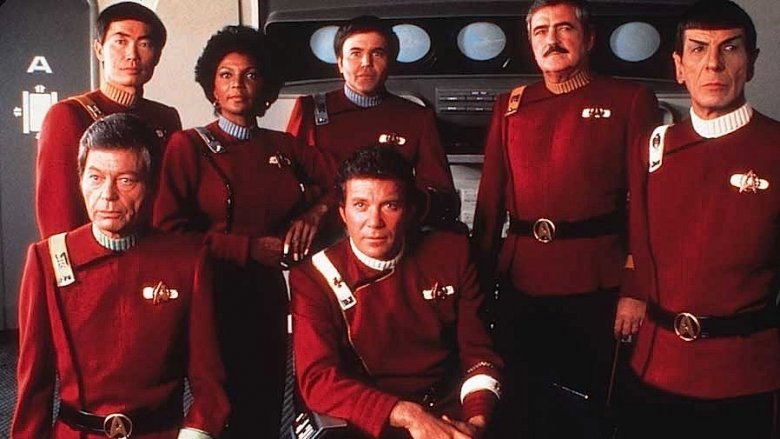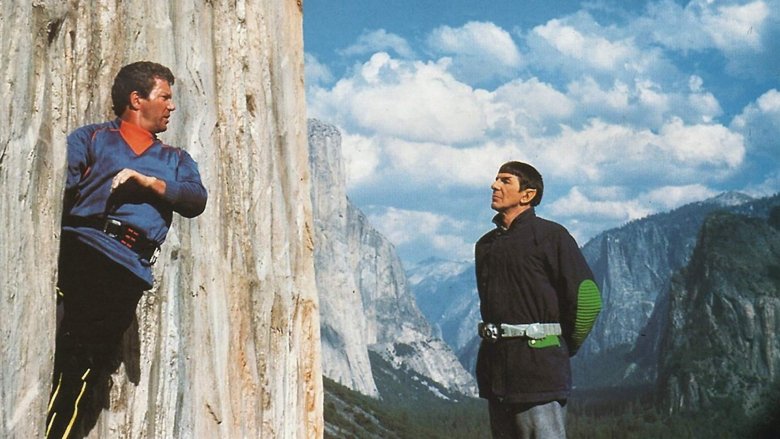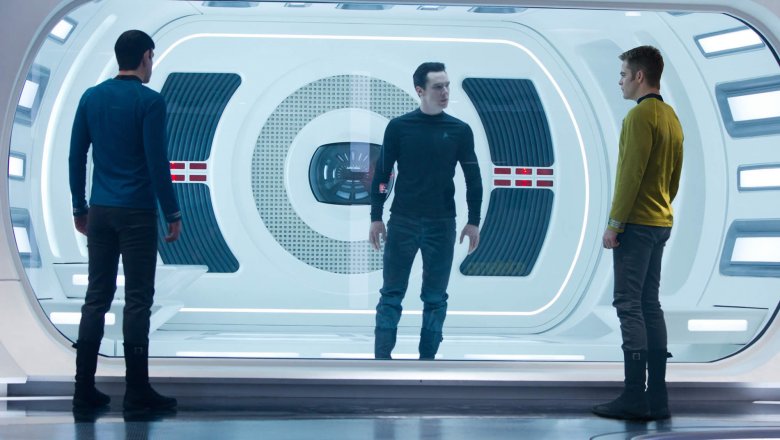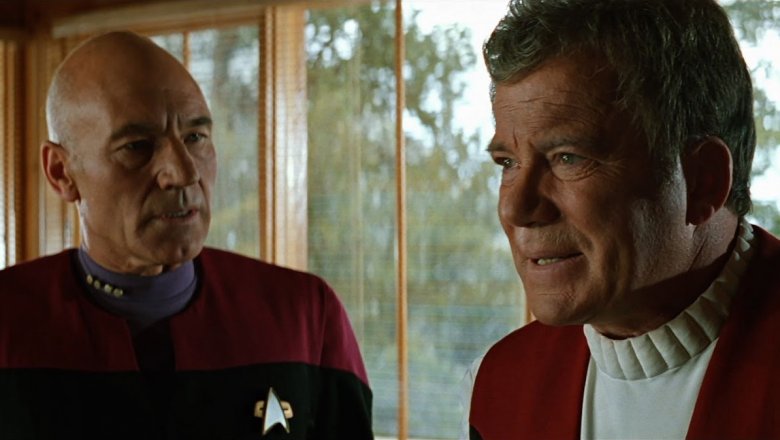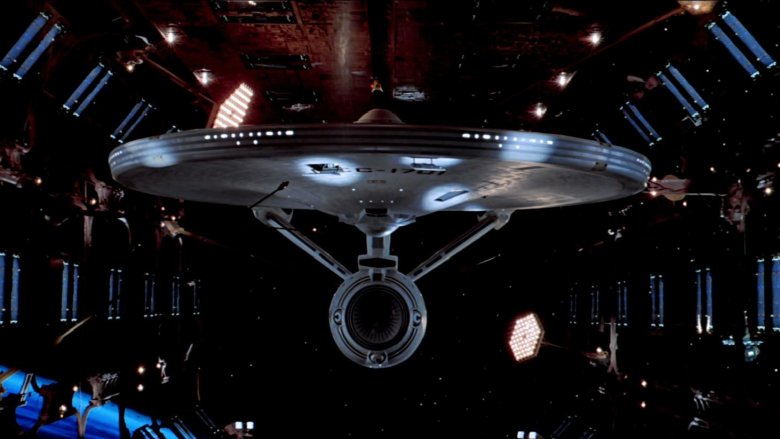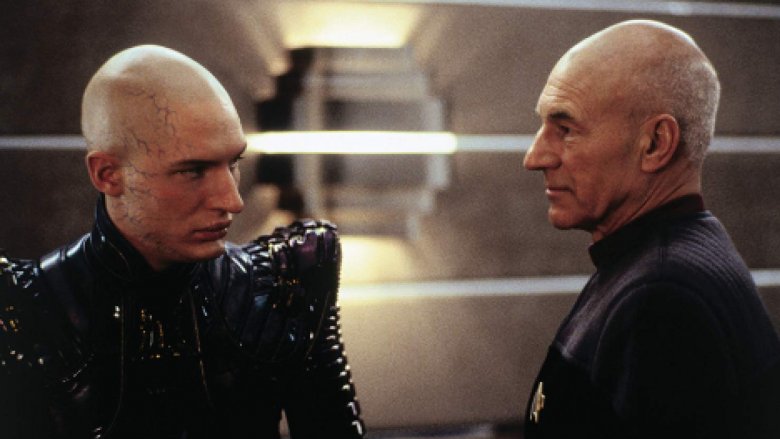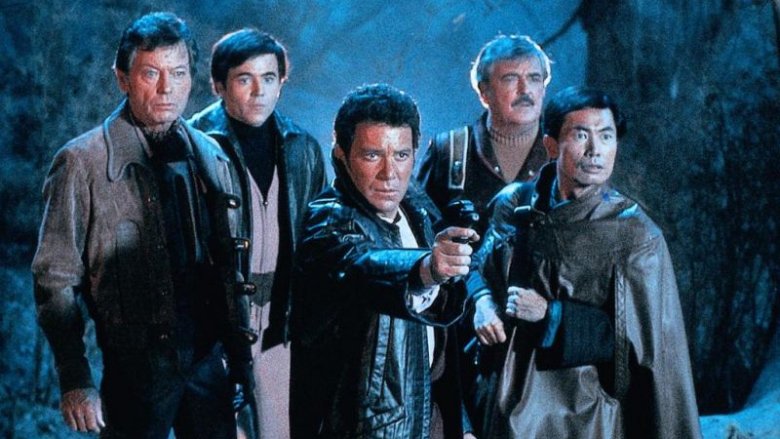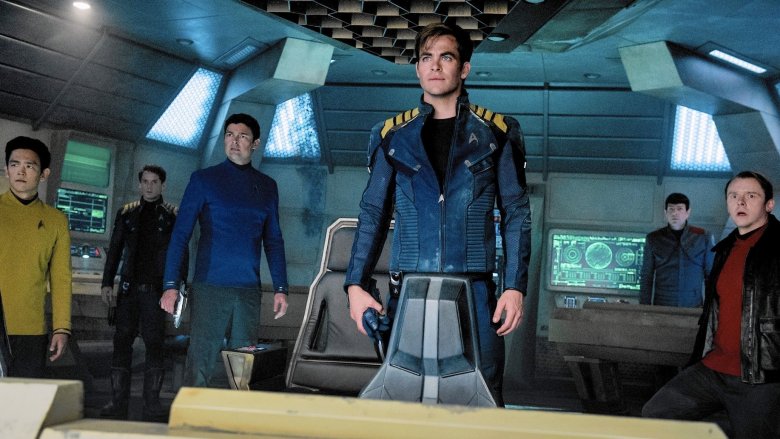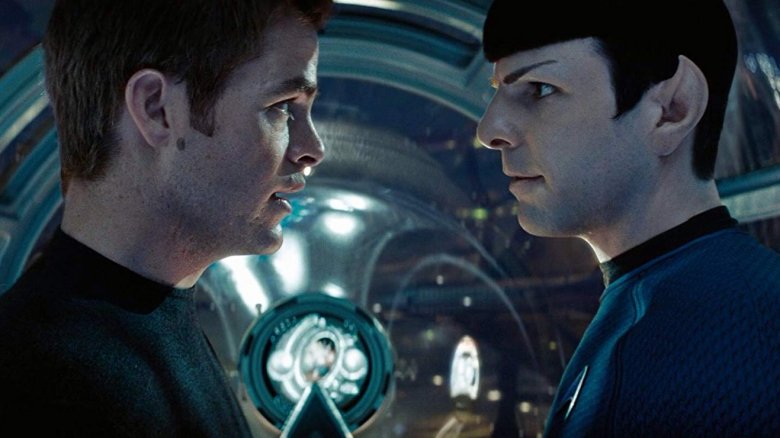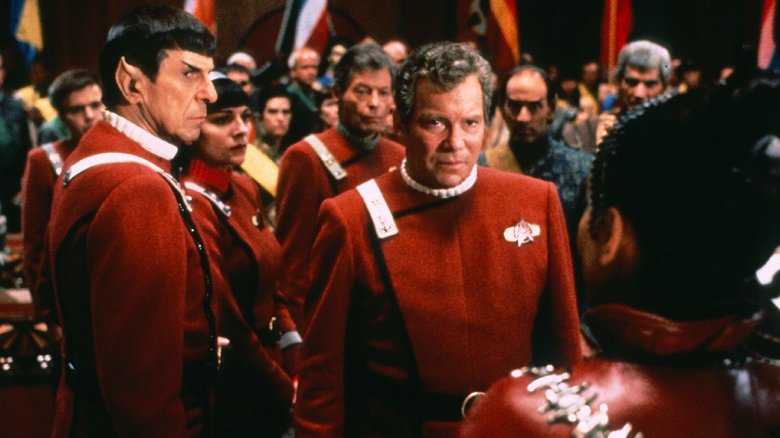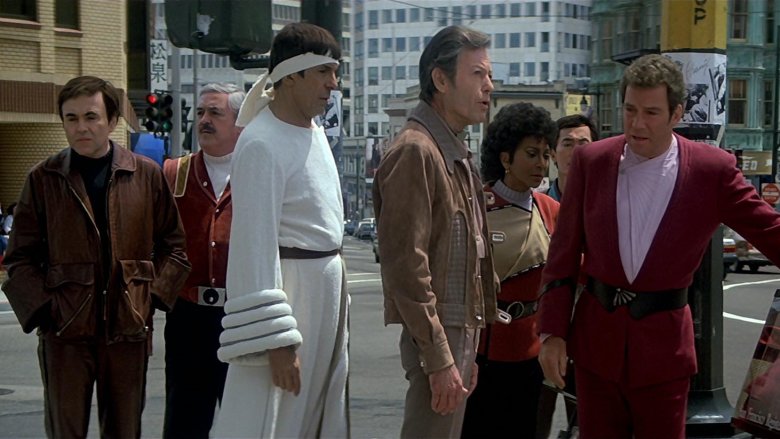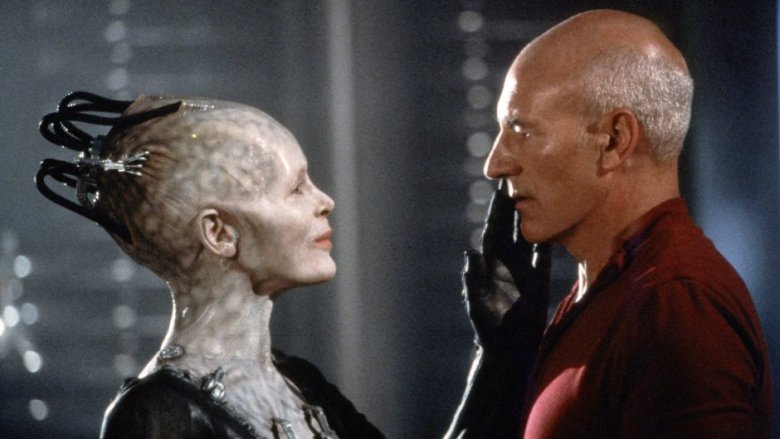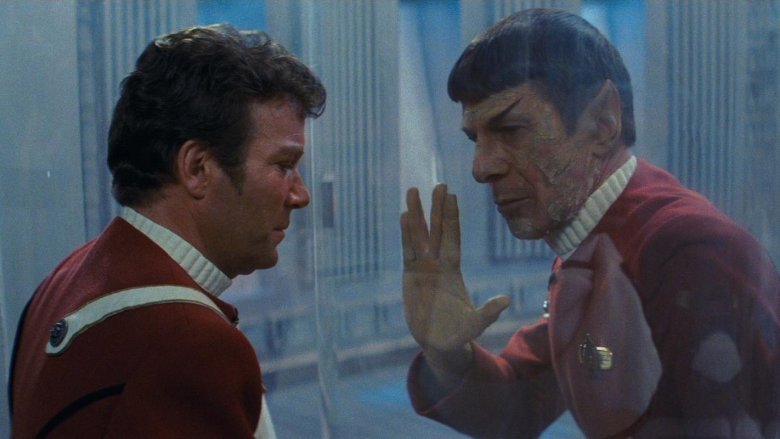Star Trek Movies Ranked From Worst To Best
In the four decades since Star Trek: The Motion Picture hit the big screen, Star Trek — a franchise already more than a decade old when it first made the leap to cinemas — has flourished, spawning five more television series, countless novels, toys, comic books, video games and, most importantly for our purposes, a whopping dozen additional films with three different casts.
An impressive and expansive history like that is bound to spawn debate, and the flames of those debates are always fanned by the intense passion that comes with Trek fandom. With that in mind, figuring out which Star Trek film is the best and which is the worst can be a tricky process. You have to weigh a lot of things — casting, sci-fi storytelling, faithfulness to the "spirit of the franchise," which itself carries a different meaning for everyone — and no matter how carefully you weight them you'll always find a few people ready to tell you how wrong you are. Still, the upside is that through ranking each Star Trek film, you get to boldly go where no one has gone before more than a dozen times. With that in mind, here's our ranking of every Star Trek film so far, from the worst to the best.
Star Trek V: The Final Frontier
At this point in the history of the franchise, labeling The Final Frontier the worst Star Trek movie ever made almost feels like cheating, as if fans are meant to search for some angle of re-appraisal that will allow it to rise above its reputation if only for a moment. Alas, it feels like that will never happen. The film starts with a particularly ambitious premise: a rogue Vulcan full of mystical ideals wants to lure the Enterprise to his planet so he can essentially head to the center of the galaxy and find God. But the story keeps crumbling in one way or another along the journey before finally delivering an anticlimactic conclusion.
In the end, what holds it together is the chemistry of the original cast, whose roles fit them so well at this point that they could probably play their parts in their sleep, but that's not enough to save the movie. An uneven tone (Uhura does a sultry fan dance at one point on this quest for God), rocky plot, and subpar special effects weigh The Final Frontier down despite its lofty ideas.
Star Trek: Insurrection
The most common criticism you're likely to encounter with regard to Star Trek: Insurrection, the third outing for the Next Generation cast, is that it plays mostly like an extended episode of the TV series. That's still a fair observation 20 years after its release. The film follows the Enterprise crew as they visit a planet emitting a radiation that rejuvenates the inhabitants, rendering them basically immortal. Of course, another race hopes to take the planet and harvest that radiation for themselves, with the help of forces within the Federation. Picard and his crew rebel against direct orders to stop it, even as they experience certain effects of the planet themselves.
It's a solid concept, but it falters when stretched to a feature length film. The pacing can't compare with the other films of the TNG era, particularly First Contact and Nemesis. As with The Final Frontier, though, the cast is well-versed in their respective characters, and each one of them has an opportunity to lend some charm to the film, from Data belting Gilbert and Sullivan to the resurgence of the Riker/Troi romance. Patrick Stewart is also brilliant, as usual, but even his commanding presence can't lift this film very high.
Star Trek Into Darkness
The second film in the "Kelvin timeline" reboot continuity that began with Star Trek in 2009 has a lot going for it. The near-flawless cast from the first film is back, along with the addition of Benedict Cumberbatch as the film's villain and the return of J.J. Abrams in the director's chair. As a result, the film is peppered throughout with memorable moments, from ambitious action setpeices and character comedy to some truly thrilling sequences when everything really does come together.
Unfortunately, if you look at the film as a whole, everything actually comes together pretty rarely overall, and the central problem is the Khan reveal. The "twist" that Cumberbatch is not playing "John Harrison" but instead this timeline's version of Khan Noonien Singh (something fans suspected for months before the film's release only to be told over and over that they were wrong) is a twist that only exists for the audience, not the characters, and it drags the film down. From there, everything devolves into a weird mirror universe Wrath of Khan remake that's not nearly as satisfying as the film that inspired it, and far too many things happen just to move the right pieces into place to achieve this. It becomes a film engineered to deliver a few key moments, and everything around those moments suffers.
Star Trek: Generations
The first film to feature the Next Generation cast is also the film that finally gave an answer to one of the ultimate Trekkie questions: What would happen if Captain Kirk (William Shatner) and Captain Picard (Patrick Stewart) met? The answer: not as much as you'd like. In Generations, the crew faces a villain played by Malcolm McDowell who wants to find his way back to a realm called The Nexus, where the laws of time don't seem to apply and you can live out your deepest desires. To do this, he's willing to destroy any stars and planets in his path, and that's where Picard and Kirk, who entered the Nexus after seemingly dying decades earlier, come in.
There are a few wonderful sequences here, including the first meeting of the two captains and an unforgettable crash landing of the saucer section of the Enterprise, but overall Generations is a very mixed bag. It stutters in its pacing, pulls back from big ideas just when they seem to be getting interesting, and sometimes even sacrifices what could be great character moments for scenes of things like horseback riding instead. For a film with such titanic characters at the center of it, it's sadly underwhelming.
Star Trek: The Motion Picture
The first big screen outing for the Star Trek franchise ever is famously — or infamously — slow, even by the standards of 1970s science fiction. In the years following the blockbuster success of Star Wars, the environment was finally right for the original crew of the Enterprise to see their return to live action. And while it's certainly a sentimental favorite for many fans, the thrill just isn't there, or at least not as much as it should be.
On the positive side, there are many truly gorgeous shots of the Enterprise gleaming in all its Hollywood glory...so many of them that you sometimes start looking at your watch waiting for a plot point to come along. There are also the familiar faces from the original series cast, who somehow feel like they never lost a step between the cancellation of the TV series and the beginning of the film. The film also has the advantage of some big sci-fi ideas to help carry it to an at least semi-compelling ending. But then there's the rest of it...the dragging plot, the drab uniforms, and the overall focus on the spectacle of finally getting a Star Trek movie instead of actually delivering a Star Trek movie that was truly worth waiting for. It's a milestone, to be sure, but better things lay ahead.
Star Trek: Nemesis
Nemesis, the final film to feature the Next Generation cast, is not a great Star Trek film, but it is a ridiculously entertaining one. The film sees the crew of the Enterprise — fresh off celebrating the wedding of Riker and Troi — visiting the Romulan homeworld of Romulus, where a new praetor (Tom Hardy) has taken over the Empire. The big twist: He's actually a clone of Picard, created by the Romulans years before to serve as a covert replacement for the captain, until the Romulan government changed hands and he was left to die as a slave. Now he's back, he's seized power, and he's ready to wipe out of the Federation with a superweapon.
It's far from the most intellectual of Star Trek films, but the whole cast shines in their respective roles, and Hardy chews every piece of scenery in sight as the newcomer Shinzon. He's gloriously campy, and it sets just the right tone for this dark, strange film that's as close to B-movie sci-fi glory as any Trek film gets. It's a fun, if very flawed, installment, and a solid send-off for the second generation of the franchise's stars. It might be goofy, but it's definitely not boring.
Star Trek III: The Search for Spock
The best way to follow a classic like The Wrath of Khan is to do everything you can to avoid copying Wrath of Khan, and in that respect The Search for Spock succeeds very admirably. It does take another risk, though, and that's making the driving force of the whole film a mission to essentially undo the great emotional punch that came to define The Wrath of Khan. Every Trek fan knew going into this film that Spock was dead, and yet the idea that he would live again was right there in the title. How do you possibly pull that off? By making the film about Kirk and McCoy suffering to save their friend — Kirk through the ultimate death of his son, and Bones through the mental anguish that comes from having Spock's life force knocking around in his head.
It makes the trinity of stars at the heart of the original series cast shine even when they're not sharing the screen. Throw in a new Klingon menace led by a wonderful Christopher Lloyd performance and the gorgeous green Klingon Bird of Prey, plus a fun and funny ship-stealing sequence, and you have a winning third installment that kept up Trek's hot streak.
Star Trek Beyond
This Star Trek film from 2016 completes a trilogy of movies starring the Kelvin timeline cast and succeeds, in part, by both running away from Into Darkness and by doing some of the things that film did — but better. Like the second film in this franchise iteration, the focus is again on a villain intent on vengeance against Starfleet, someone who seems to be thinking several moves ahead of the Enterprise crew. Unlike that film, however, Beyond more-or-less kicks off with throwing away many of the franchise hallmarks, crashing the Enterprise and leaving the crew with whatever hope they can find on an alien planet.
The same energy that drove the first two films is there, the cast still looks like they're having fun, and the setpieces this time around are far more inventive than the more formulaic approach of Into Darkness. Plus, this film's climax heavily depends upon playing a Beastie Boys song as loud as possible. That's always fun, but it's especially fun in space.
Star Trek (2009)
The film that began the most recent big-screen timeline of Star Trek films had a very tough assignment from the start. Not only was it an attempt to jump-start a franchise that hadn't been at the multiplex for seven years and hadn't released a new episode of television in four years — it was also an attempt to jump-start the franchise with familiar characters played by entirely new faces. How do you recast Kirk, or Spock, or Uhura? How do you possibly replace faces that have loomed in the public imagination for decades, and through six fairly recent films of their own? Somehow, J.J. Abrams and company pulled it off.
The first great success of 2009's Star Trek is in its casting, which is stellar across the board but particularly in the forms of Chris Pine as Kirk, Karl Urban as McCoy, and Zachary Quinto as Spock. Then there's the story, which found a way to render everything in a new way without sacrificing the old timeline. The film, in fact, even incorporates some of it thanks to Leonard Nimoy's return as an older, alternate Spock. It's not a perfect film, particularly when it leans too much on action and not enough on character, but it's about as good as we could have dared hope for in a reboot of this kind.
Star Trek VI: The Undiscovered Country
The last ride of the original series cast is a timely Cold War metaphor that still holds weight nearly three decades after its release. The film begins with a big Chernobyl metaphor when an energy-producing Klingon moon explodes, then transitions into a story about the Klingon Empire essentially wanting to bring down the wall that separates them from the Federation, which could, in effect, render Starfleet obsolete. Led by Kirk — who has no love for Klingons, the Enterprise crew is sent to escort the Klingon negotiators, only to have it all fall apart as a conspiracy unfolds around them.
It has everything you want from an original series cast movie: big ideas, high stakes, a cool space battle centerpiece, Kirk and Spock being best friends, Kirk kissing a pretty alien woman, a Klingon quoting Shakespeare, and Spock taking command of the ship for a little while. Plus, everyone seems to know it's their last hurrah, so the film is packed with unforgettable sendoff moments.
Star Trek IV: The Voyage Home
Even people who have a hard time calling it the objectively "best" Star Trek film will rather quickly admit that The Voyage Home might at least be their favorite film in the franchise. The Voyage Home — or "the one with the whales," as it's known to casual fans — is perhaps the best example ever of Star Trek's ability to adapt itself to fit different genres, and sometimes even fit more than one genre into a single story.
The Voyage Home begins with a sci-fi high concept: the crew must go back in time to rescue some extinct whales because they're the only beings capable of communicating with a dangerous object out in space in the present of the timeline. Soon it evolves into an endlessly charming character comedy once the gang arrives in 1980s San Francisco. Even Kirk, the self-proclaimed expert on past human culture, is a fish out of water, but any sense that you're about to watch something far too silly for Star Trek is quickly washed away by the film's overall arc. It's Star Trek at its most pure fun, but it never sacrifices the core of the franchise.
Star Trek: First Contact
The Next Generation cast got to make their own time travel movie too, and it's the best film of their era by a large margin. In First Contact, the Enterprise crew follows a Borg ship through a time vortex to prevent the cybernetic race from altering history and assimilating all of Earth through intervention on the 2063 day when humans first made contact with Vulcans.
So, the element of fun that's inherent in the franchise's time travel plots is there almost from the beginning, but then the film gets into deeper territory. It retains all the fun and charm of the Next Generation series at its best moments (including a very clever Holodeck sequence) while also becoming a meditation on the nature of history, how we define our heroes, and what it means to be human. Plus, it's a chance for the franchise to finally showcase the Borg in all their terrifying glory on the big screen, a spectacle that still holds up today.
Star Trek II: The Wrath of Khan
It is exceedingly rare to find a sequel that surpasses the first film in a series. There are a few of them — The Godfather Part II, Terminator 2: Judgment Day, The Dark Knight — that arguably fit the bill. But perhaps none loom larger in the history of a franchise than Wrath of Khan.
After Star Trek: The Motion Picture arrived — pretty and ambitious, but lacking the energy the franchise needed to survive on the big screen — the future of Star Trek's films got revamped, and we got a revenge tale about an old enemy from the TV series rediscovering the Enterprise crew and wreaking havoc on them. Ricardo Montalban is deliciously nasty as the title villain, and the film manages to be a showcase for everyone else in the main cast while it barrels forward through threat after threat.
The space combat sequences are wonderfully tense, the mental chess match between Kirk and Khan is unforgettable, and of course the climactic moments that built to the loss of Spock make the film an inarguable classic. You can show Wrath of Khan to almost anyone, even someone who's never cared about Star Trek at all, and odds are they'll find something to like in it. It's not just the best Star Trek film. It's one of the best science fiction films ever made.
